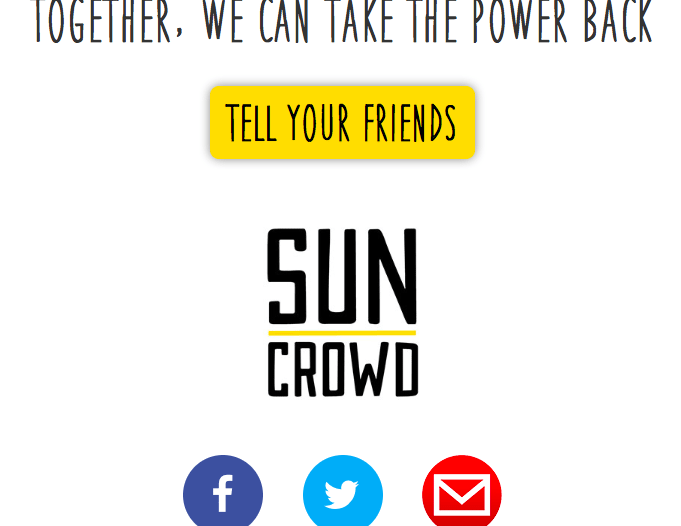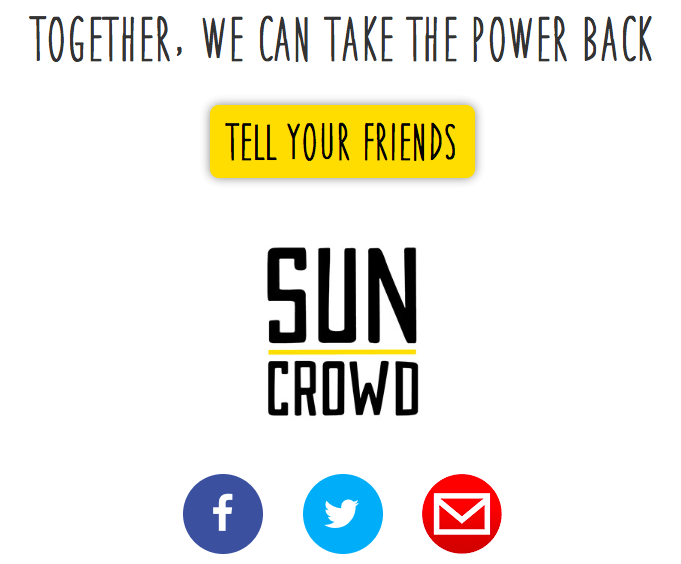
The first bulk-buy program for battery storage in Australia has been launched by a group of prominent consumer advocates, who aim to lower the price of battery storage for individual and community projects, and to make installation easier.
SunCrowd is the first initiative of a new group that brings together Simon Sheik, the former head of Get-Up and founder of fossil-free super fund Future Super, and energy economist and community energy pioneer Chris Cooper.
The group is launching its first trial in Newcastle this week, liaising with a local community energy group Climate Action Newcastle, before launching across New South Wales in July and the rest of the country in 2017.
NSW is being targeted because of the impending end of the premium feed-in tariffs, which is expected to drive huge demand for battery storage when around 140,000 households face higher bills as their generous 60c/kWh and 20c/kWh expire, and are replaced by voluntary tariffs of around 6c/kWh.
That is expected to inspire many households to install batteries so that they can store the output from their solar arrays for use in evening, rather than sending it back to the grid at low cost.
 But, although there are predictions of massive uptake of battery storage in Australia – with the latest research saying up to 2.8 million households could adopt battery storage if costs fall, and network tariffs change – Cooper says that battery storage remains expensive at the moment, and choosing the right battery is complicated.
But, although there are predictions of massive uptake of battery storage in Australia – with the latest research saying up to 2.8 million households could adopt battery storage if costs fall, and network tariffs change – Cooper says that battery storage remains expensive at the moment, and choosing the right battery is complicated.
The aim of the SunCrowd campaign is to try to lower costs through bulk-buying, and by demystifying the issues around the technology, and streamline the installation of battery storage.
“Battery storage is complex and it is still expensive,” Cooper told the Local Energy & Microgrids conference, hosted by RenewEconomy and One Step Off The Grid in Sydney last week. “We are going to drive affordability and make it easy and acceptable, and to build trust.”
The campaign will feature a centralised online platform, and will also liaise with community and strike local partnerships. The Newcastle Climate Action group brought together 550 people in a solar bulk-buying program way back in 2008, and Cooper said he hoped this campaign would also attract at least one hundred buyers.
Battery storage will be the first technology targeted by the group, which says that new technologies will emerge over the next 10 years that will fundamentally change the nature of energy markets.
“We are motivated by the goal of a 100% renewable energy future, where the people have the power,” SunCrowd says.
“Our community-run energy storage bulk-buy campaigns are the first of many that will help our members adopt the exciting new technologies we need for a clean, smart energy system.”
SunCrowd says that a bulk-buy program will use the bargaining power of the “crowd” to get lower, affordable prices for energy storage.
“We expect to be offering products at below market prices,” it says. “With our combined bargaining power and streamlined supply chain we can offer lowest prices, without compromising on technology.”
The campaign will choose two or three different battery types, selected for performance, warranty, brand integrity, price, expandability, smart technology inclusions, aesthetics, safety, and ease of installation.
The program will also include advice on best feed in tariffs for solar exports back to the grid, and meter replacements, which will likely be required when the premium tariffs end, as well as a solar PV “check-up” – to make sure that the systems work properly – and advice on expanding the arrays if needed.
Giles Parkinson is founder and editor of One Step Off The Grid, and also edits and founded Renew Economy and The Driven. He has been a journalist for 35 years and is a former business and deputy editor of the Australian Financial Review.



